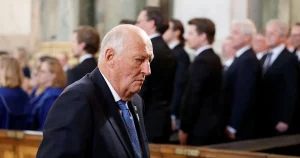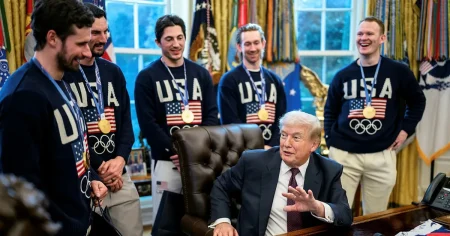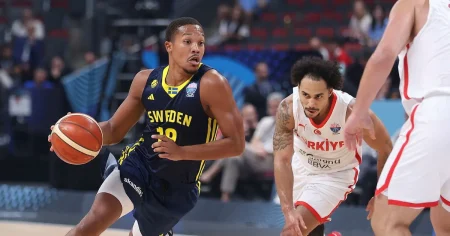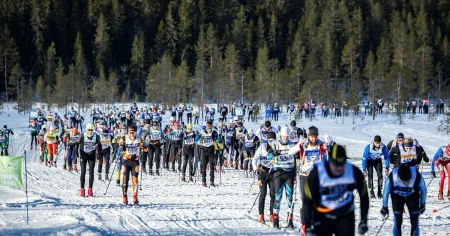FIFA’s extraordinary congress, held virtually on Wednesday, officially confirmed the pre-determined hosts for the 2030 and 2034 World Cups. FIFA President Gianni Infantino and General Secretary Mattias Grafström presided over the proceedings from Zurich, connecting with representatives from 211 member associations participating remotely. The decision, already effectively made a year prior by FIFA’s ruling council, saw a joint bid by Spain, Portugal, and Morocco, with three matches slated for Argentina, Paraguay, and Uruguay, awarded the 2030 tournament. Saudi Arabia secured the hosting rights for the 2034 World Cup. The vote, conducted by acclamation, saw all but Norway endorse the selections. Norway voiced its objections to the host selection process, highlighting the ongoing controversy surrounding the awarding of major sporting events. The announcement sparked widespread celebrations in Saudi Arabia, with public gatherings, fireworks, and drone light shows illuminating major cities like Riyadh, Jeddah, and the futuristic Neom region.
The Saudi Arabian government, including Sports Minister Abdulaziz bin Turki Al-Faisal, hailed the decision as a moment of national pride and an opportunity to showcase the country to the world. The win further solidifies Saudi Arabia’s growing dominance in the international sporting landscape, with the nation also set to host the Asian Football Championship in 2027, the Asian Winter Games in 2029, and the inaugural Olympic Esports Week in 2025. The celebrations, guided by a dedicated ”celebration booklet,” are planned to continue until December 14, encompassing various events across 14 cities. Drone light shows projected messages like ”Welcome to Saudi 34” and images of the World Cup trophy onto the night sky. Controversially, reports suggest that the acronym ”PIF,” representing the Saudi Arabian Public Investment Fund, chaired by Crown Prince Mohammed bin Salman, was also displayed during the drone displays.
Star footballers playing in the Saudi League, including Neymar, Cristiano Ronaldo, Karim Benzema, and Riyad Mahrez, took to social media to express their enthusiasm for the announcement. Ronaldo, in a published video, affirmed his intention to attend the tournament, praising the Saudi people and the country’s capacity to host major events. He characterized Saudi Arabia as a nation with high entertainment value and a bright future. This excitement from high-profile players reflects the significant investment Saudi Arabia has made in its football league, attracting global talent and elevating the nation’s sporting profile. While the exact dates for the 2034 tournament remain undefined, the anticipation and excitement are already palpable, highlighting the significant role football plays in the country’s national identity and its aspirations for international recognition.
Preparations for the tournament are already underway, with four of the fifteen proposed stadiums currently in existence. Three additional stadiums are under construction for the 2027 Asian Football Championship, and another eight are planned specifically for the 2034 World Cup. This massive infrastructure development reflects the significant financial commitment Saudi Arabia is making to host the prestigious event. The selection of Saudi Arabia, however, has drawn significant criticism from human rights organizations and labor unions, who cite concerns about migrant worker exploitation and potential human rights abuses. Amnesty International, for instance, has voiced strong concerns about the potential for exploitation and even fatalities among migrant workers involved in the construction projects.
The award of the 2030 World Cup to the joint Spain, Portugal, and Morocco bid, with additional matches in Argentina, Paraguay, and Uruguay, marks a unique multi-continental hosting arrangement. The inclusion of South American nations in the tournament commemorates the centenary of the first World Cup, held in Uruguay in 1930. This dispersed hosting approach, while celebrating historical significance and promoting global participation, also raises logistical and organizational challenges. The decision further underscores the increasing globalization of football and the willingness of FIFA to explore new formats for its premier tournament. The contrasting contexts of the 2030 and 2034 World Cups highlight the diverse challenges and opportunities facing the global football landscape.
The FIFA decision, while generating excitement and anticipation for upcoming tournaments, also underscores the complex interplay of sports, politics, and human rights. The selection of Saudi Arabia, a nation facing ongoing scrutiny for its human rights record, and the novel multi-continental approach for the 2030 tournament highlight the evolving nature of major sporting events. The coming years will undoubtedly see continued debate about the social and political implications of these hosting decisions, as well as the responsibility of governing bodies like FIFA to uphold human rights principles in the context of global sporting competitions. The future of football, it seems, will continue to be shaped by these complex and often contentious considerations.














